Related Research Articles

Mercury Records is an American record label owned by Universal Music Group. It had significant success as an independent operation in the 1940s and 1950s. Smash Records and Fontana Records were sub labels of Mercury. Mercury Records released rock, funk, R&B, doo wop, soul music, blues, pop, rock and roll, and jazz records. In the United States, it is operated through Republic Records; in the United Kingdom and Japan, it is distributed by EMI Records.

Edmund "Ed" Kuepper is a German-born Australian guitarist, vocalist and songwriter. He co-founded the punk band The Saints in 1973, the experimental post-punk group Laughing Clowns and the grunge-like The Aints!. He has also recorded over a dozen albums as a solo artist using a variety of backing bands. His highest charting solo album, Honey Steel's Gold, appeared in November 1991 and reached No. 28 on the ARIA Albums Chart. His other top 50 albums are Black Ticket Day, Serene Machine and Character Assassination. At the ARIA Music Awards of 1993 he won Best Independent Release for Black Ticket Day and won the same category in 1994 for Serene Machine.
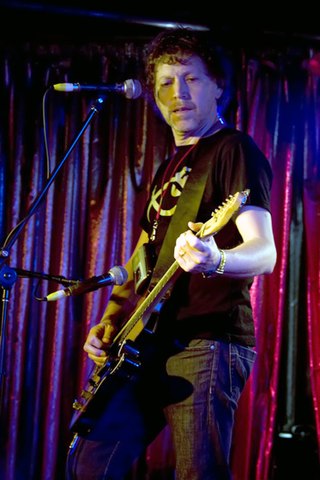
Kim Leith Salmon is an Australian rock musician and songwriter from Perth. He has worked in various groups including The Scientists, Beasts of Bourbon, Kim Salmon and the Surrealists, Kim Salmon and the Business, and Darling Downs. Australian rock musicologist, Ian McFarlane, described Salmon as one of the first Australians to "embrace wholeheartedly the emergent punk phenomenon of the mid-to-late 1970s" with The Scientists. He declared that Beasts of Bourbon were "masters of uncompromising gutbucket blues and hard-edged rock'n'roll". In 2004 Salmon was inducted into the West Australian Music Industry Association Hall of Fame and in 2007, into the Music Victoria Awards Hall of Fame.
Smudge are an Australian rock and indie pop trio formed in 1991 by Paul Duncan on bass guitar, Alison Galloway on drums and Tom Morgan on guitar and vocals. Morgan is known outside Australia as a song writing collaborator of Evan Dando and his band, the Lemonheads. In 1994 Duncan was replaced on bass guitar by Adam Yee and in 1997 Pete Kelly joined on guitar. Smudge signed with Half a Cow to issue four studio albums, Manilow (1994), Hot Smoke and Sassafras (1994), You Me Carpark. .. Now (1996) and Real McCoy Wrong Sinatra (1998), before going into hiatus from late 1999. Since 2002, Smudge play a few times a year. There has been no new music since 1998.
Half A Cow is an independent record label from Australia, established in 1990 by Sydney musician and music identity Nic Dalton.
Swirl were an Australia indie rock band, forming in 1991 by Ben Aylward on guitar and vocals, David Lord on drums and Nicola Schultz on bass guitar and vocals. Schultz left in 1997 and was replaced by Richard Anderson on bass guitar and keyboards and Keira Hodgkison on guitar and vocals. They released three albums, Aurora, The Last Unicorn and Light Fill My Room, before breaking up in December 2002.
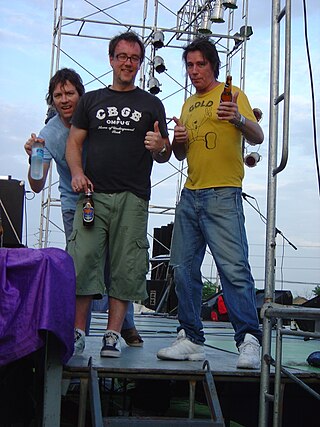
The Fauves are an Australian rock band formed in 1988. The band are known for their witty lyrics, melodic pop-rock and often satirical or evocative exploration of Australian themes.

Anthony Moore is a British experimental music composer, performer and producer. He was a founding member of the band Slapp Happy, worked with Henry Cow and has made a number of solo albums, including Flying Doesn't Help (1979) and World Service (1981).
The Orange Humble Band is an alternative rock band formed in early 1995, by Darryl Mather on guitar. He was joined by Anthony Bautovich, Mitch Easter on vocals, and Ken Stringfellow on lead vocals. The group issued two albums, Assorted Creams (1997) and Humblin' (2001) before disbanding later that year. They reformed in March 2012 and issued a third album, Depressing Beauty, in May 2015.
Sidewinder were an Australian indie pop group founded in 1990 in Canberra by Pip Branson on guitar, Martin Craft on bass guitar and backing vocals, his brother Nick Craft on lead guitar and vocals, and Giri Fox on drums. Early in 1994 Shane Melder replaced Fox on drums and in the next year the group relocated to Sydney. Sidewinder were staples of the Australian alternative rock scene in the 1990s and released two studio albums, Atlantis and Tangerine. Australian musicologist, Ian McFarlane, described them as "an accessible brand of distortion-drenched, harmony-driven, indie guitar power pop." Sidewinder released two albums and three EPS between 1992 and 1998, all of which were critically acclaimed and received solid Triple J and commercial airplay. These albums ‘traversed a broad sonic terrain, from Beatlesesque psychedelia to eardrum shattering ballsy rock’. Sidewinder were one of the ‘best loved live acts of this decade [1990s]’. had regular spots on festival bills, including the Big Day Out and played every Homebake from 1996 to 1998.
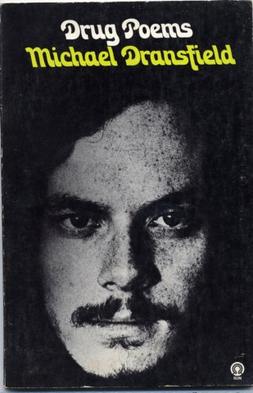
Michael Dransfield was an Australian poet active in the 1960s and early 1970s who wrote close to 1,000 poems. He has been described as "one of the most widely read poets of his generation."
Godstar were a psychedelic pop band which formed in 1991. The group's founding mainstay, Nic Dalton, is a multi-instrumentalist who was also in The Plunderers, Sneeze and The Lemonheads, and ran the Half A Cow record label. Other members were Robyn St Clare The Hummingbirds, Alison Galloway on drums (ex-Jupiter) and Tom Morgan on guitar and vocals. In September 1993 the band toured nationally promoting their debut studio album, Sleeper. In July 1995 their second album, Coastal, appeared and was followed by another national tour. The group disbanded later that year. Dalton's Half a Cow label issued further Godstar material under the name The Godstar Reminder. Around this time, Dalton formed other groups including The Kombi Nation, The Ultimate Vanilla and Chewee. Galloway and Morgan were also members of Smudge, an indie pop band, during their time with Godstar.
Tamam Shud is an Australian psychedelic, progressive and surf rock band, which formed in Newcastle in 1964. The initial line-up were known as The Four Strangers with Eric Connell on bass guitar, Dannie Davidson on drums, Gary Johns on rhythm guitar and Alex "Zac" Zytnik on lead guitar. At the end of that year Johns was replaced by Lindsay Bjerre on guitar and vocals as they trimmed their name to the Strangers. By late 1965 they had become the Sunsets. They took the name Tamam Shud in late 1967 after replacing Connell with Peter Barron on bass guitar. The group released two albums, Evolution (1969) – after which Tim Gaze replaced Zytnik on lead guitar – and Goolutionites and the Real People (1970) before disbanding in 1972. After a lengthy hiatus they reformed in 1993 to release a third album, Permanent Culture in 1994, but disbanded again in 1995. Beginning in 2008 the group worked together periodically on new material: it took eight years to complete their fourth album, Eight Years of Moonlight.
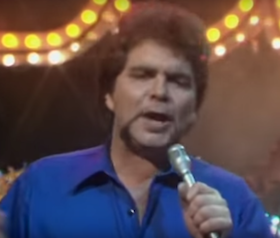
Douglas John Parkinson was an Australian pop and rock singer. He led the bands Strings and Things/A Sound (1965), the Questions (1966–1968), Doug Parkinson in Focus, Fanny Adams (1970–1971), the Life Organisation (1973), Southern Star Band (1978–1980) and Doug Parkinson Band (1981–1983). Doug Parkinson in Focus's cover version of the Beatles' track "Dear Prudence" peaked at No. 5 on the Go-Set National Top 40. The follow-up single, "Without You" / "Hair" (October), also reached No. 5. Parkinson released solo material and performed in musical theatre productions.
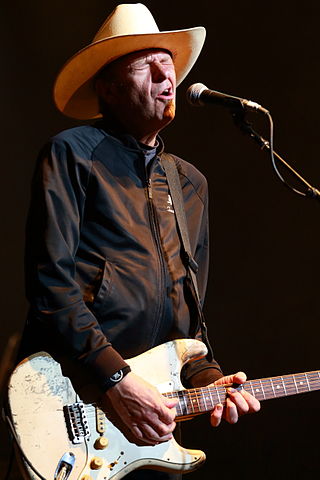
Spencer Patrick Jones was a New Zealand guitar player and singer-songwriter from Te Awamutu. From 1976 he worked in Australia and was a member of various groups including The Johnnys, Beasts of Bourbon, Paul Kelly and The Coloured Girls, Chris Bailey and The General Dog, Maurice Frawley and The Working Class Ringos, and Sacred Cowboys. He also issued ten albums as a solo artist. In May 2012 Australian Guitar magazine rated Jones as one of Australia's Top 40 best guitarists.
Jack Frost were a short-term Australian rock band, a side project for Grant McLennan and Steve Kilbey. They released two albums, Jack Frost (1991) and Snow Job (1996). Australian musicologist, Ian McFarlane, determined their material, "ranged from romantic ballads to tough rock, with the two singers' voices fitting together well."
Nicholas James "Nic" Dalton is an Australian multi-instrumentalist and record label owner. He was a member of various Australian bands including, The Plunderers (1984–95), Godstar (1991–95) and Sneeze (1991–present); as well playing with Ratcat and The Hummingbirds. He was the bass guitarist for American band, The Lemonheads in the early 1990s. He also runs the record label Half a Cow, which he co-founded 1990. His current bands are The Sticker Club and, until recently, the Gloomchasers.
Sheila and B. Devotion was a disco group fronted by French singer Sheila between 1977 and 1980. This formation briefly reached popularity in Europe and to a lesser extent in the US club circuit during the disco era. The group recorded two albums before dissolving in 1980, when Sheila returned to her solo career.
The Plunderers were an Australian band which formed in May 1984 in Canberra. The group's founding mainstays were Nic Dalton on bass guitar and vocals and Stevie Plunder on guitar and vocals. The group issued three mini-albums, Trust Us, Sarah's not Falling in Love, and Home Movie (1992); a live album, 13.7.91 Live! Live! Live! (1991); and three albums, No Era Is Safe (1986), Half A Cow (1986), and Banana Smoothie Honey (1992). Australian musicologist, Ian McFarlane, described their sound as "a punky brand of power pop that mixed frantic guitar riffs, sharp harmonies and diamond-hard pop melodies" before starting to "explore a more tripped-out kind of psychedelic revivalism". In 1989 Dalton and Plunder and their drummer, Geoff Milne, formed a side project, Hippy Dribble, playing their more psychedelic songs. In December 1990 the trio also formed Captain Denim to play "more laid-back songs mostly ... influenced by the likes of Buffalo Springfield, Country & Western and folk rock". Both these groups issued material including a split album, Silver Apples/Fade in 1994. In 1992, Dalton joined US band The Lemonheads and former Plunderers' keyboard player Andy Lewis and Plunder formed The Whitlams with Tim Freedman. Plunder died on 25 January 1996, at the age of 32 years and Lewis died on 12 February 2000, at the age of 33 years.
The Wreckery are an Australian punk blues group which formed in 1985 in Melbourne. The founding members were Hugo Race on vocals and guitar, Robin Casinader on drums, piano, Hammond organ, guitar and violin, Edward Clayton-Jones on guitar, organ and vocals, Tadeusz O'Biegly on bass guitar, and Charles Todd on saxophone and organ. Within a year, Nick Barker had replaced O'Biegly on bass guitar. The band issued two studio albums, Here at Pain's Insistence and Laying Down Law (1988), before disbanding in mid-1989. In 2008, they briefly reunited in support of a compilation album, Past Imperfect.
References
- Mudie, Peter (1997), Ubu Films: Sydney Underground Movies 1965-1970, University of New South Wales Press, ISBN 978-0-86840-512-4
- 1 2 3 4 5 6 7 Proud, Pip; Nichols, David (2008). "Drugs, Dransfield, Women and Songs". Meanjin . 67 (2). Archived from the original on 16 May 2010. Retrieved 21 December 2017.
- 1 2 3 4 5 6 7 8 9 10 11 12 13 14 Keavney, Kay (31 December 1969). "He's running away from success". The Australian Women's Weekly . Vol. 37, no. 31. p. 9. Retrieved 20 December 2017– via National Library of Australia.
- 1 2 Nickey, Jason. "Pip Proud | Biography & History". AllMusic . Retrieved 21 December 2017.
- 1 2 3 4 5 6 7 McFarlane, Ian (1999). "Encyclopedia entry for 'Pip Proud'". Encyclopedia of Australian Rock and Pop . St Leonards, NSW: Allen & Unwin. ISBN 1-86508-072-1. Archived from the original on 19 April 2004.
- 1 2 Kimball, Duncan (2002). "Pip Proud". Milesago: Australasian Music and Popular Culture 1964–1975. Ice Productions. Archived from the original on 14 March 2009. Retrieved 20 December 2017.
- ↑ Ramage, Iain; Ney, Michael; Proud, Pip (1975), Upon the Dancing, Milsons Point, NSW: K&K, ISBN 978-0-9597057-0-6
- 1 2 3 Coley, Byron. "Pip Proud on EM – Will the Real Syd Barrett Please Stand Up". Forced Exposure . Retrieved 21 December 2017.
- 1 2 3 Nichols, David (18 March 2010). "Absurd and Beautiful: A Tribute to Pip Proud". Mess+Noise. Junkee Media . Retrieved 21 December 2017.
- ↑ "Long Exposure - ben butcher's photo blog: Pip Proud - RIP". 3 November 2010.